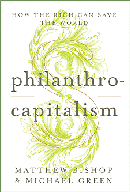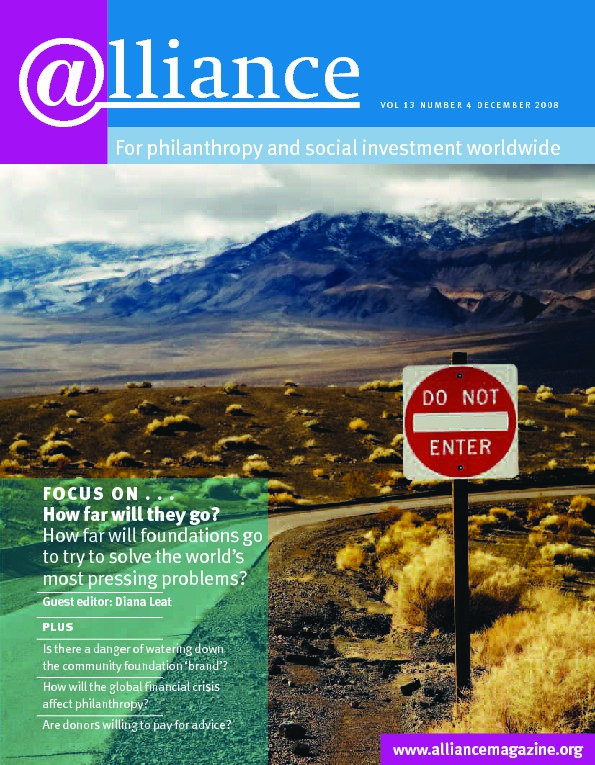 This is a book worth reading for anyone interested in today’s philanthropy. The philanthropic landscape presented (though with a strong Anglo-Saxon bias) challenges the reader with the bold view that the ‘philanthrocapitalism revolution’ will succeed in eradicating the world’s toughest problems where governments, NGOs and businesses have failed.
This is a book worth reading for anyone interested in today’s philanthropy. The philanthropic landscape presented (though with a strong Anglo-Saxon bias) challenges the reader with the bold view that the ‘philanthrocapitalism revolution’ will succeed in eradicating the world’s toughest problems where governments, NGOs and businesses have failed.
Its central thesis is that what makes philanthrocapitalists so successful is that they are ‘hyperagents’: they ‘apply to their giving the same talents, knowledge and intellectual vigor that made them rich in the first place’ and leverage their formidable wealth and ‘convening power’. They are also ‘free from the usual pressures that bear down on politicians and activists and company bosses with shareholders to please’, in other words: unaccountable.
My own view is that while some philanthrocapitalists are indeed extremely capable, not all of them are, and though they are all unaccountable, they shouldn’t be.
Are they all capable?
The authors write: ‘Over the centuries, behind many a great social movement there was a wealthy philanthropist.’ Shouldn’t we add: and there was always a great social entrepreneur in the front? In 1803, Jean-Baptiste Say introduced the concept of entrepreneur into Adam Smith’s theory of wealth creation, saying that the role of the capitalist (supplier of capital) and entrepreneur (supplier of idea and talent) could be combined but are essentially different. Shouldn’t we also separate philanthropist from social entrepreneur?
Some of the philanthrocapitalists described in the book do indeed perform both roles, like financier Peter Wheeler who created (philanthropic) investment advisory firm New Philanthropy Capital, or private equity veteran Stephen Dawson who created hands-on social investor Impetus. But in other cases, one wonders whether these would-be philanthrocapitalists shouldn’t have followed Warren Buffett’s example and trusted their money to people ‘who could do a better job of dispersing wealth’.
Should they be unaccountable?
The authors acknowledge the need for a new social contract between ‘the rich and everyone else’: the rich should be more transparent about the effectiveness of their giving while ‘the public’ and politicians should avoid ‘billionaire bashing’. But the primary goal of such a social contract should be to ensure that these immense resources are deployed as efficiently and effectively as possible.
This is needed for two powerful reasons. First, the substantial tax breaks given to philanthropic endeavours mean (depending on countries) that up to two-thirds of the money they give is actually taxpayers’ money. Second, the book says that ‘some of society’s largest problems are likely to be impossible to solve without the support, and the active involvement, of the citizenry’. I would say ‘all’, not ‘some’.
Solving these problems would require that the social contract be ruthlessly enforced, that is, that philanthrocapitalists suffer the consequences of their failure to perform, as they would in their business lives. The book quotes Bill Gates: ‘In the economy you get this type of specialization – you just have to because (of) the competitive feedback.’ The authors also say: ‘Philanthropy lacks many of the market forces that keep businesspeople disciplined, focused on success, and willing to make the tough decisions necessary to survive and prosper.’ These include limiting your role to being a passive philanthropic investor when others are better active investors or entrepreneurs than you are.
As I suggested in the September issue of Alliance, a possible way to instil such competition would be to oblige philanthropists wanting to benefit from tax breaks to spend a minimum 10 per cent of their endowment every year. To avoid the dwindling of their organization, they would need to convince other investors that they can do ‘a better job of dispersing wealth’ in order to compete to raise new funds. Only the best would succeed, forcing the badly needed consolidation and specialization of the foundation sector. This would also clarify the roles of philanthropists (individual investors), intermediaries (fund managers, private equity and advisers) and social entrepreneurs, mirroring the structure of business.
The publication of this book coincides with one of the greatest financial debacles in history. Will the philanthrocapitalist revolution turn out to be a bubble?
Olivier Kayser is a Senior Adviser to businesses and citizen sector organizations. Email olivier@kayser.fr
Philanthrocapitalism: How the rich can save the world
Matthew Bishop and Michael Green Bloomsbury (USA) and A & C Black (UK) $27/£15.29
ISBN 1596913746
To order
http://www.philanthrocapitalism.net



Comments (0)